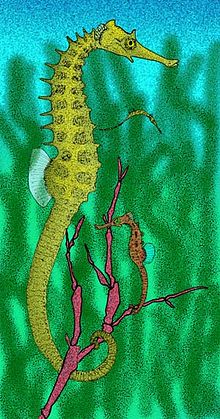Hippocampus sarmaticus
| Hippocampus sarmaticus Temporal range: Middle Miocene | |
|---|---|

| |
| Artist's reconstruction with the smaller S. slovenicus on the right | |
| Scientific classification | |
| Domain: | Eukaryota |
| Kingdom: | Animalia |
| Phylum: | Chordata |
| Class: | Actinopterygii |
| Order: | Syngnathiformes |
| Family: | Syngnathidae |
| Genus: | Hippocampus |
| Species: | †H. sarmaticus |
| Binomial name | |
| †Hippocampus sarmaticus Žalohar, Hiti, Križnar, 2009[1] | |
Hippocampus sarmaticus is an extinct species of seahorse, found in 2005 in the coprolitic horizon of the Tunjice hills Lagerstätte in Slovenia, along with the related Hippocampus slovenicus.
Taxonomy
The horizon dates 13 million years back to the lower Sarmatian during the middle Miocene period, making the two species the earlier known seahorse fossils in the world. Among the remains, one adult female specimen is fully preserved, with bony plates and other important macroscopic features. The rest are mostly juvenile specimens and remains of head and backbones of adults.[1]
The animals are believed to have lived among seagrasses and macroalgae in the temperate shallow coastal waters of the western part of the central Paratethys.[1]
References
- ^ a b c Žalohar J.; Hitij T.; Križnar M. (2009). "Two new species of seahorses (Syngnathidae, Hippocampus) from the Middle Miocene (Sarmatian) Coprolitic Horizon in Tunjice Hills, Slovenia: The oldest fossil record of seahorses". Annales de Paléontologie. 95 (2): 71–96. Bibcode:2009AnPal..95...71Z. doi:10.1016/j.annpal.2009.03.002.
Further reading
- Choi C. (May 4, 2009) "PHOTOS: Oldest Seahorses Found; Help Solve Mystery." National Geographic news.
- Žalohar J. Fossil seahorses - treasure from the ancient seas.
